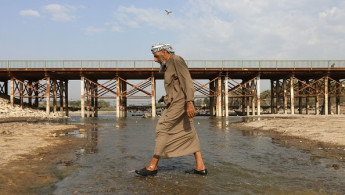Two sentenced to death in Iraq over activist's abduction
An Iraqi court has sentenced two men to death in absentia for the 2020 kidnapping and disappearance of an anti-government activist, the judiciary said Wednesday.
A criminal court in southern Dhi Qar province ordered Idriss Kurdi and Ahmed Mohammed Aboud, "who abducted activist Sajjad al-Iraki", to be hanged, in a March 16 ruling, according to a statement released by the Supreme Council of Iraq.
A prominent activist in anti-government protests that rocked Iraq in October 2019, Iraki, aged in his 20s, has not been seen since September 2020, when witnesses and security force sources say armed men forced his car to stop and kidnapped him near Dhi Qar's provincial capital, Nasiriyah.
Kurdi and Aboud remain at large and lawyers working on their behalf have 30 days to appeal the sentences before the decree authorising their execution is signed by Iraq's president.
In October 2019, young Iraqis led a nationwide protest movement that vented frustration at inept governance, endemic corruption and interference by Iran, sparking a bloody crackdown that left more than 600 dead and tens of thousands wounded.
Some activists died in targeted assassinations, including former government adviser Hisham al-Hashemi who was shot near his home in July 2020.
Mustafa al-Kadhemi, the prime minister until October 2022, had pledged to hunt down the perpetrators of the murders.
Last October, a man was sentenced to death for the murder of an activist in the protest movement, and in November 2021, another man received the same sentence for killing two journalists during protests in Basra in Iraq's south.
In June 2022, the United Nations mission in Iraq denounced an "environment of fear and intimidation" that has stifled freedom of expression in the conflict-scarred country.
The UN report noted "persistent impunity with respect to targeted attacks against protestors" as well as against people "seeking accountability for these attacks, and activists and critics espousing views critical of armed elements and affiliated political actors".





 Follow the Middle East's top stories in English at The New Arab on Google News
Follow the Middle East's top stories in English at The New Arab on Google News
![The UAE is widely suspected of arming the RSF militia [Getty]](/sites/default/files/styles/image_330x185/public/2024-11/GettyImages-472529908.jpg?h=69f2b9d0&itok=Yauw3YTG)
![Netanyahu furiously denounced the ICC [Getty]](/sites/default/files/styles/image_330x185/public/2024-11/GettyImages-2169352575.jpg?h=199d8c1f&itok=-vRiruf5)
![Both Hamas and the Palestinian Authority welcomed the ICC arrest warrants [Getty]](/sites/default/files/styles/image_330x185/public/2024-11/GettyImages-2178351173.jpg?h=199d8c1f&itok=TV858iVg)